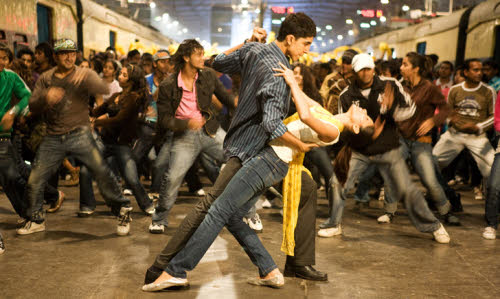by Gauri Trivedi
[box]Songs can do wonders: Gauri Trivedi tells us how one song made her feel more accepted in her foreign land.[/box]Music transcends boundaries. It took me three years and four months and a hip-hop performance from a small dance school tucked away in a quiet suburb of the ‘Beaver’ State to be convinced.
22nd February, 2009 was no ordinary day for Indians. A shy music composer with a divinely extraordinary talent went on to win the Oscar for his song ‘Jai Ho’ from the movie ‘Slumdog Millionaire.’ The audience stood up in applause as an Indian music composer walked away with the highest recognition in the world of cinema. The less privileged applauded in front of their television sets.
I shared the pride and triumph with millions of Indians at home and abroad. Slumdog Millionaire got India into the limelight (not necessarily for the right reasons), but overnight everybody was talking about the movie and the song which got an Academy award. I watched the movie soon enough – it seemed like the least I could do considering that it had so much of ‘India’ in it – but not before I read Vikas Swarup’s ‘Q & A’(being more of a reader then a movie watcher). I was also curious to know if this movie that revolved around a game show and a romantic lead was as “Oscar-worthy” as it was made out to be. In my modest opinion, the movie was as gimmicky as the book!
During that year and in a different State/place, I volunteered at the local library, the only person at that point of time who hailed from the land of Slumdog Millionaire. Over the next couple of weeks, post the broadcast of the Academy Awards on television, I became a reasonably sought-after source of information at my workplace. Co-workers wanted to know if there were any houses with decent toilets in India. They also asked if India was as terribly crowded as shown in the movie and if people danced on the road every day. Many of these questions smelled of a tiny bit of disdain mixed with inquisitiveness. I enjoyed the attention but hated being quizzed on the stereotype of a developing nation that the movie had created with all its visuals of poverty and grime. It was an outsider’s view of my country and I did not fully agree with it, and I made that part very clear whenever an opportunity came by.
Fortunately for me, I did get a chance to showcase nice things about India too as some of the people I worked with were genuinely impressed by the film and its music. The volunteer manager at the library wanted information on the book on which the movie was based and she also had a long chat with me on how humble she thought the brilliant music composer looked as he accepted the award for that immensely catchy song. She read the book, then watched the movie and one day as I left the library, she handed me a handwritten piece of paper on which she had jotted down a list of words for me to decipher for her. The list contained ‘Bhel Puri,’ ‘Holi’ and many such other words native to the Indian culture and lifestyle.
And yet, apart from the initial euphoria, I never felt that the achievement by an Indian made any difference to my life. The cultural tolerance and acceptance theory felt like an allegory to me. I was different, a non-native, an outsider and (though legal), a possible immigrant.
Not until today.
The lights go dim and the stage glimmers in soft lights. A familiar music starts playing and a group of pretty girls dressed in colourful outfits start to occupy the stage one after the other. The song picks momentum and with it the stage comes alive, musical and vibrant. The lyrics flow in waves as the young artistes swing to the beat, their costumes adding even more colour and shine to the recital. I am mesmerized by the long skirts and embellished tops, modified to resemble the traditional Indian outfit of Ghaghra-Choli, the plaited hair-dos and prominent Bindis making colorful circles on their foreheads. The dance itself is trendy and fast paced, choreographed beautifully, keeping in mind the energy and skill levels of the eight-year-old participants.
The girls smile as they swirl and jump and do their number on the stage. They do not understand a word of what the song speaks to them and yet every one of them is singing it in bits and parts as they dance to it tune. They carry themselves with utter grace, not showing any sign of awkwardness in the alien attire. The bindis gleam even from a distance, as these young artistes enthrall the audience. Looking around, I see the rest of the spectators enjoying this performance as much as the previous one, unfazed by the words they cannot comprehend. If anything, there is a faint recognition of the song on many of their faces, and it is perhaps not as foreign to them as I presumed it to be.
I find it hard to concentrate, caught between the dance and the song. It isn’t the piece of music alone or the dance by itself, it is the mélange that it represents; the acceptance it conveys, which stirs something deep inside, a feeling of assimilation that gathers as a lump in my throat and refuses to subside.
Gauri Trivedi is a former business law professional who makes the law at home these days. A Mom to two lovely daughters, her days are filled with constant learning and non- stop fun. All of her “mommy time” goes into writing and finds itself on her blog pages http://messyhomelovelykids.blogspot.com/ and http://pastaandparatha.blogspot.com/ and if she is not writing she is definitely reading something!
[facebook]Share[/facebook] [retweet]Tweet[/retweet]






